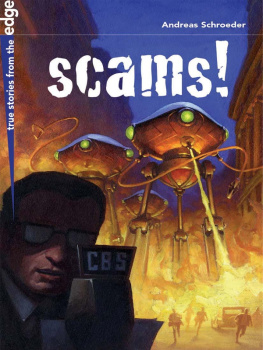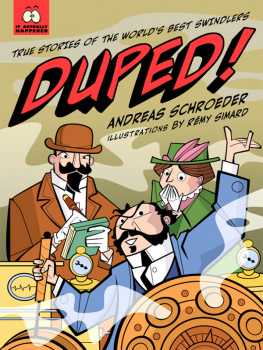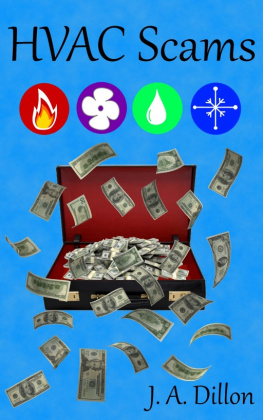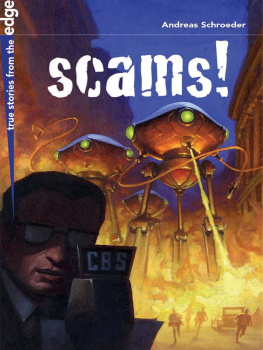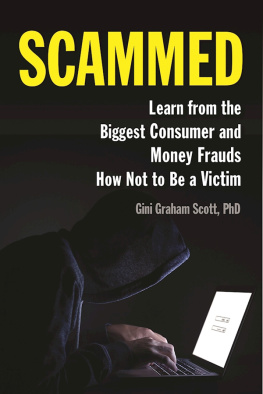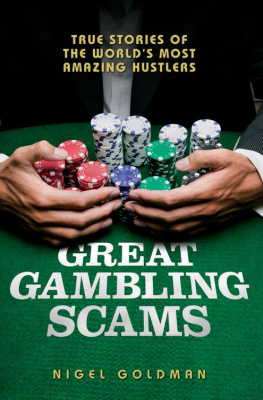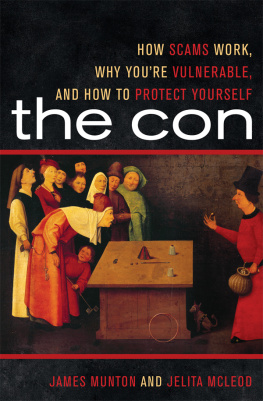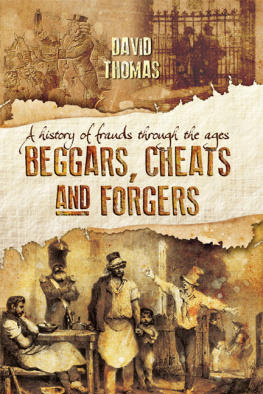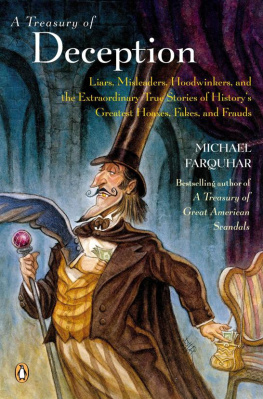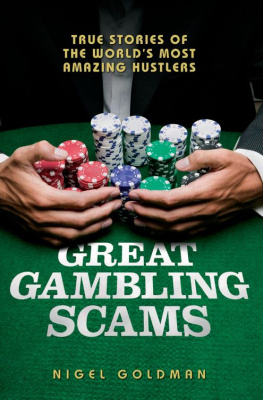
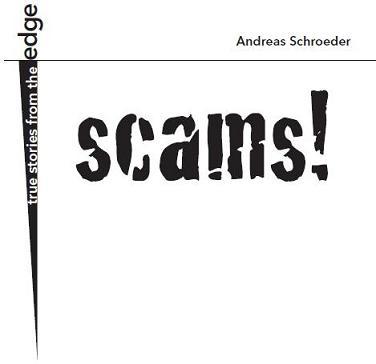
Ten stories that
explore some of the
most outrageous
swindlers and tricksters
of all time

Contents
Introduction:
What Are Scams, Anyway?
The Tasaday: Stone-Age Cavemen
of the Philippines
War of the Worlds:
A Martian Invasion
Instant Globe-Circling:
Just Add Water
Introduction
What Are Scams, Anyway?
I N 1916, an American inventor named Louis Enricht announced that he had discovered a cheap additive that turned ordinary tap water into automotive fuel. At a time when World War I was raging in Europe and gasoline was selling for a whopping 30 cents a gallon, Enricht claimed that his additive would bring the per-gallon cost down to a single penny.
That certainly got everyones attention.
Enricht let a crowd of reporters check that his jug was full of ordinary tap water, then poured in a small amount of greenish liquid, stirred it up, and invited everyone to test this miraculous mixture in their own vehicles.
They didand it worked!
Enrichts demonstrations were so convincing that even the world-famous automaker Henry Ford offered him millions to buy the rights for his additive.
Actually, Enricht had merely discovered that if you add a very cheap chemical called acetone to water it will run an enginefor a while. Then it will destroy it. But before anyone found that out, Enricht had managed to convince not only Henry Ford, but several other famous American businessmen who should have known better, to give him millions of dollars for his worthless invention.
So Enrichts claim was too good to be true, and that is one of the main characteristics of scams. Another is money. Most scam artists invent scams to fool their victims into giving them moneythough it doesnt always have to be that. It can also be something else of great value, such as love or power or fame.
Whenever we hear or read about a scam, our first reaction is often: How could those people have let themselves be fooled so easily? How could they have been so stupid?
Good question. It would make sense if only stupid people fell for scamsbut they dont. Perfectly intelligent people fall for scams too. People like you and me.
So what is it that makes perfectly intelligent people shut off their brains and fall for crooks like Louis Enricht?
Sometimes its just greed. The tantalizing chance to get something for nothing. Its one of the oldest motivators of humankind. And here were talking about both the scam artists and their victims. Most scams wouldnt work if the victim werent a little greedy too.
Oscar Hartzell, a poor farm boy from Iowa, understood that very well when he cooked up the idea of contacting everyone in the United States whose surname was Drake. He told them hed made an astonishing discovery: due to a bureaucratic bungle, the estate of the famous British pirate Sir Francis Drake had never been paid out to his heirs. It had just been sitting there for over 300 years, gathering interest. So by now it was worth an eye-popping four trillion dollarsenough money to buy all of England, Scotland, Ireland, and Wales combined! Hartzell invited Drakes from all over North America to invest in his campaign to take the British government to court to retrieve that money. He promised that everyone would make at least $500 for every dollar invested.
You wouldnt believe how many people fell for that scam. Not just thousandstens of thousands. Housewives sent Hartzell their grocery money. Kids sent him their allowance. Retirees sent him their life savings. Some ministers even sent him their church donations! The former farmers boy from Iowa was able to move to England, become a duke, and live like a king in a mansion with maids, cooks, butlers, gardeners, and drivers. Even after the FBI checked out his story and announced that it was a total lie, that Sir Francis Drakes wife had inherited and duly received her husbands estate back in 1597, people kept sending Hartzell their money. Even after Hartzell was arrested, tried, and sent to Leavenworth Penitentiary, people still kept sending him their cash. They didnt stop until he finally died, in prison, after operating his scam for over 30 years.
Hard to believe? Some people say, well, that was 1913, people werent so sophisticated then. But I dont see much evidence of that. Consider some of the scams that operate through e-mail and the Internet today. Theres the famous Nigerian Letter, for example, that people have been receiving via e-mail for the past several years. In it, a wife or close relative of a Nigerian politician informs you that her husband managed to smuggle a vast fortune out of the country before his recent death. If you will help, she will give you a quarter (25 percent) of that fortune for your trouble.
If you reply, youll be informed that the money is being held by a security company that will give you the fortune if youll pay them an administrative fee of $2,000. If you send them this fee, theyll request a customs fee, a notarization fee, a clearance fee, and on and onas long as they can keep stringing you along.
According to the police, thousands of people get taken in by this kind of scam every year. In fact, the Nigerian letter is merely the latest version of what used to be called The Spanish Letter. Believe it or not, there are historical references to this scam that go back over 400 years.
So greed accounts for a significant percentage of successful scams. But scams also pop up very reliably whenever theres a great need for something. Scams thrive on need and desperation. Lets say you borrowed someones guitar and lost it, and it will cost hundreds of dollars to replace. How would you respond if someone offered to get you a replacement for, say, a mere 20 dollars? Or if youve always dreamed of a) being more popular, b) looking better, or c) being more successful, do you feel tempted by magazine advertisements promising to give you all that and moreif youll just buy miraculous products that contain SECRET ingredients?
The people who fall for these sorts of scams arent more or less intelligent than those who are merely greedy. They do so because they badly need this solution to be true. Theyre willing to put all their hope and money on the tiny possibility that they mightmaybe, possiblyget whats promised.
I got caught in a scam myself in my twenties, when I threw my clothes and manuscripts into my truck and headed for the bright lights of Toronto. (Thats where publishers were going to fall all over themselves in their eagerness to publish my work.) About a days drive from Toronto I skidded through a corner and drove off the highway into the ditch.
The small-town mechanic to whose garage I was towed looked at my mangled truck and shook his head. I suppose we could fix it, he said. But I can get you a much newer truck for half the price. He explained that a friend of his worked for a business that repossessed automobiles, which it then auctioned off. For peanuts, he assured me. You wouldnt believe the deals I can get. The company doesnt careit just wants to unload those vehicles fast.
But there was a catch. (Theres always a catch with a scam.) To buy at this auction, you had to pay for the vehicle on the spot, and my mechanic friend had little cash to spare. He suggested I leave him my truck and a cheque for $1,000. That would get me a near-new pickup at the next auction, whenever it happened. In the meantime hed start to work on my old truck. If by some chance he couldnt get me that newer truck, I could apply the $1,000 to the repair of my old one.
Next page
